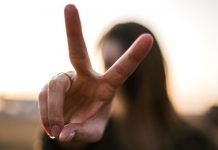
by Kate Ristow, Dan Thomas, Chris Weber, and Sister Janet Schaeffler
Q: One of my students shared a great story and I didn’t know how to use the story as a teaching moment. He said that a person who was homeless came up to him as he was unlocking his bike at a corner food-mart where his dad had sent him to buy batteries. The man asked for “just the change from what you bought.” The child told me that he didn’t know if he should give the man the $1.37 change he had in his pocket—he just didn’t know if his dad would be okay with that. He ended up lying and saying that he didn’t have any change, and he sped off on his bike. What could a catechist do with a story like that?
—At a loss in Bethlehem, PA
Chris Weber’s Answer
A: If your student didn’t ask the class outright for advice, it is just as well that you did nothing with it. There is potential to embarrass the student, with a classroom full of his peers “armchair quarterbacking” the situation! If the boy asked for advice about what he should have done, the door is wide open to the teaching moment that you mention.
Here’s one way to process this scenario with a class. Write the major moments of the story in bullet form on the board or newsprint so that the class can think it through. Then make a grid with the following headings: Problems; Feelings; Church Teaching; Possible Actions; Possible Results.
Problems: Invite the class to brainstorm the problems connected to the situation. The obvious problem here is that a man appears to need money. Help students examine additional dilemmas, like the facts that the man is a stranger and the change does not belong to the boy but to his dad.
Feelings: After spelling out the problems, list all possible feelings that might be at play. One might have mixed feelings: compassion and sympathy, fear of strangers, worry about what the parent will say, and more. Remind the class that it is helpful to pay attention to our feelings in situations like this, as they often give us strong clues as to the best action to take. Remind the class that if at any time they do not feel safe, the best choice is to get out of the situation.
Church Teaching: Brainstorm Church teachings that come into play. In this vignette, Church teachings include caring for the poor as well as two Commandments: Honor your father and mother, and Do not bear false witness. Note that regardless of the teaching, the Church would not encourage children to endanger themselves.
Possible Actions, Possible Results: Finally, talk through possible actions and their likely outcomes. From what you have written, I think that your student did the right thing to leave the scene.
Yet, it would be great to discuss additional actions. Did the student discuss the incident with his parents? Perhaps he can find another way to reach out to the poor, like making a donation to a food pantry, prayerfully calling to mind the homeless person. Processing this type of scenario with your class is great for building moral decision-making skills.
Chris Weber has worked in the field of catechesis for over 20 years: as a catechist, a parish catechetical leader, and a diocesan staff member. He is currently Director of the Mount Summer Program at Mount St. Mary’s University in Emmitsburg, MD.
Kate Ristow’s Answer
A: This child’s story is indeed a teachable moment. When I first read your letter, I was baffled about how to respond because you don’t tell us your student’s age. But after thinking about the situation for a few minutes, I realized that it doesn’t matter how old the boy is. He’s a kid! This matter goes directly to the issue of child safety and respect for one’s personal safety.
Think about it. The boy was approached by a complete stranger! Anything could have happened. The man could have grabbed him when the boy was distracted by retrieving his pocket change. You need to help your students recognize that they should interact only with trusted adults.
Good kids want to help others. We all want to be good Samaritans. We all want to help those who are homeless. Nevertheless, there is a time and a place for everything. The man had no business approaching the boy. The boy made a good decision to remove himself from a potential danger zone by speeding away on his bike.
If the boy feels guilty, there are plenty of things he can do—and you can encourage your class to participate in the boy’s efforts.
For example, students in the class might save up a portion of their allowances to donate to a shelter or a parish group that works with those who are poor. The class could volunteer to help stock shelves or sort clothes for the parish food pantry or St. Vincent de Paul closet after a food or clothing drive. Your whole class could work together to organize a canned-food collection in neighborhoods located within the parish boundaries—as long as they are supervised by adults.
Impress upon your students that God wants us to care for others—but not at our own peril. We are called to respect the gift of life God gave us and to take care that we avoid dangerous or unsafe situations. Praise your student for caring for and respecting his own well-being!
Kate Ristow, Contributing Editor to CATECHIST, has worked in Catholic publishing for over 25 years as a national speaker and writer, building on a wealth of experience in the religious formation of children and catechists in both parish and Catholic school programs.
Q: Our parish council just approved a new policy for next year: The religious education program fee is waived for the children of catechists who teach in the program. I was not consulted about this ahead of time, and I have voiced my disapproval. But it’s now policy. I manage those funds and, although it isn’t much, it does constitute a part of my budget for supplies. My budget isn’t being increased as a result of this new policy—and I’m going to need no fewer supplies just because a person volunteers to be a catechist. I may be able to get funds from other groups in the parish, but the whole thing just makes me feel so unappreciated and bitter. Is this grounds for quitting at the end of the year?
—Grand Prairie, TX
Sister Janet Schaeffler’s Answer
A: Your question has many ramifications and raises other questions. I realize that, at the present time, this is the policy. I also realize that the way things are done varies from parish to parish and diocese to diocese. Yet, let me wonder about a few things—which might affect the future.
You did not mention your pastor. What has been his involvement in this decision? How does he interact with the parish pastoral council? Is there a parish finance council? The 1983 Code of Canon Law makes specific reference to the establishment and role of parish pastoral councils (Canons n. 536) and mandates the establishment of a finance council in every parish (Canon n. 537).
Again, procedures and policies are different in each diocese, but these quotes from various dioceses suggest universal standards that flow from Canon Law:
“The parish pastoral council is purely a consultative body. It does not legislate, regulate, or authorize. It recommends to the pastor. The pastor remains responsible for all matters of parish governance.”
“The parish pastoral council collaborates with the pastor to discern the mission/vision of the parish;…[I]t does not manage parish operations, ministries, nor dictate program needs….”
Look at this from another view. It seems as though your council is attempting to show appreciation for the catechists (a wonderful endeavor). But what is it doing for those catechists who do not have children in the program? Might this be an opportunity to increase your budget and offer catechists a stipend? Then you might want to encourage catechists to use the stipend for their ongoing formation (books, magazines, retreats, workshops, etc.). Interestingly, I ministered in several parishes in which we offered stipends; many of the catechists returned them as donations to the parish.
Here is another consideration, which perhaps is an opportunity for ongoing formation for parishioners as well as the leadership of the parish. You mention procuring funds from groups willing to make contributions. Does liturgy need to look for funds to provide for the liturgical life of the parish? It is the responsibility of the parish to provide meaningful worship and quality faith formation.
Some parishes do not even have a fee for their catechetical programs; rather, they work extensively to educate people in stewardship. They form all parishioners (children, youth, and adults) to understand that their support of the parish provides for the ministry of the parish—for all their needs as well as for the outreach and service they are called to offer to all.
Gently ask questions. Explore all the ramifications. Are there other options available that might give messages that are more inclusive, more empowering—messages that highlight the integrity and importance of all catechists and the catechetical mission of the parish?
After many years in parish and diocesan catechetical ministry, Janet Schaeffler, OP, is currently involved in catechetical/adult faith formation consultation, writing, workshops, days of reflection/retreats, and teaching. Her website is janetschaeffler.com.
Dan Thomas’s Answer
A: I see several interesting elements to this question. The first is the issue of how we recruit catechists. That always is a challenging process that attempts to balance competency, commitment, and compensating the catechist. Some parishes offer a stipend; others offer perks, as in your example. What we are looking for are people who put their faith on the line in a way that touches the lives of their students while being able to let go of the results over which they have no control. In many ways, these are unusual and very special people.
A second concern is the budget for the program and its requirements for effective catechesis. It is a challenge even in ordinary times to cover all that is needed; today, in these very difficult economic times, many parishes are struggling financially. So how do we ensure that there are adequate resources to do what needs to be done?
A third concern is what we do when we lose on an issue that we consider important for our program.
And so how do we bring together these issues and concerns in a way that works for the parish, the catechists, those in the program, and ourselves? Here are some of my reflections.
One of the most significant components of an effective catechetical program is the catechists. They must be committed to being true witnesses of the Catholic faith whose lives speak the Goods News of God’s love for the world to the young people they catechize. Persons with this commitment are hard to find. As catechetical leaders, we must appreciate them in whatever ways we can. Your parish council chose one way to do that.
We also need the materials in order to share the Good News. Excellent textbooks and catechist manuals, a variety of materials and supplementary resources, effective training for catechists, helps for parents in their role, and much more need to be available. But which of these is the most important? I think it is the catechists.
Finally, what do we do when we lose on an issue we consider important? Most of us don’t like to lose, and the way we deal with losing says a lot about the kind of people we are. (We should try to avoid creating win/lose situations, but that may not always be possible). Each of us must make judgments about what is important to us. Ultimately, what we are about is the development of a relationship with God in the Catholic Christian community of which we are a part. Can we do this and still disagree about the specifics of how we do this?
I hope so—because this is what can make us different from what some in our society do when they lose. This is not always an easy judgment to make in specific situations. What is it that God calls you to do in yours?
Dan Thomas served in catechetical leadership for over 30 years and remains involved in the national Conference for Catechetical Leadership (NCCL). He and his wife, Eileen, are the parents of two adult sons.
Copyright 2011, Bayard, Inc. All rights reserved. This article is protected by United States copyright and other intellectual property laws and may not be reproduced, rewritten, distributed, redisseminated, transmitted, displayed, published or broadcast, directly or indirectly, in any medium without the prior written permission of Bayard, Inc.




